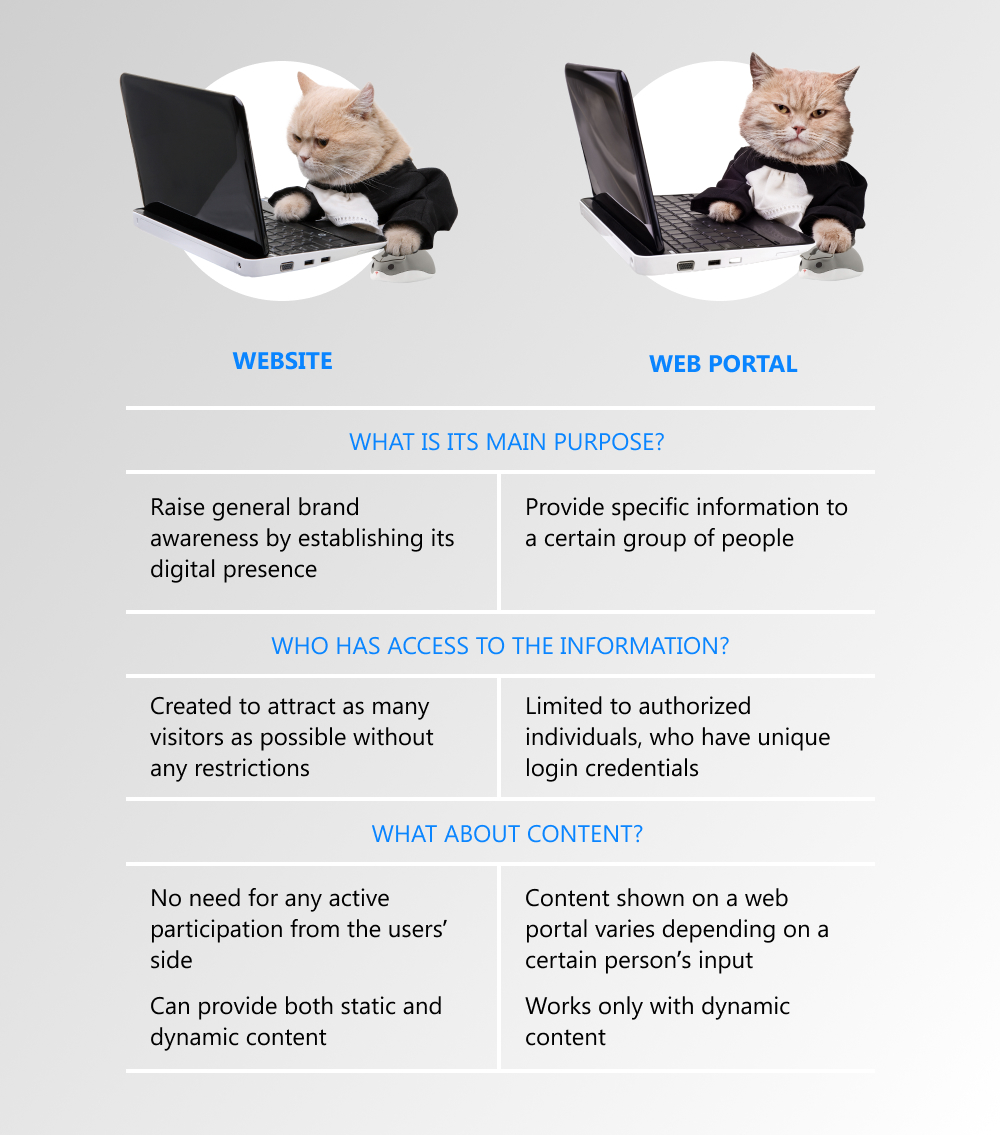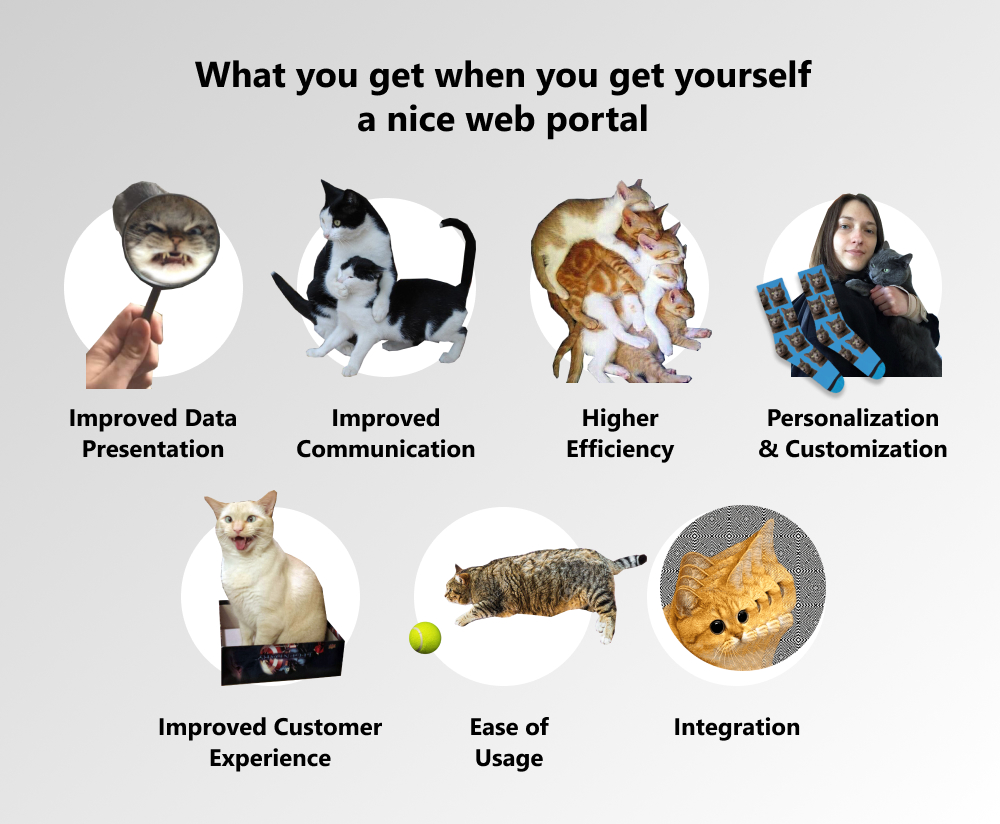Every successful business is continuously looking for ways to enhance its efficiency and profitability, whilst also improving its customer experience. For most businesses, web portal development is the way to do it, as it allows automation of numerous dull processes and leads to the increased engagement of customers, employees, and even business partners. In this post, we are going to look at what a web portal is, its benefits, and how much it costs to develop one to meet all the requirements.
written by:
Aliaksandra Tsikhanovich
Every successful business is continuously looking for ways to enhance its efficiency and profitability, whilst also improving its customer experience. For most businesses, web portal development is the way to do it, as it allows automation of numerous dull processes and leads to the increased engagement of customers, employees, and even business partners. In this post, we are going to look at what a web portal is, its benefits, and how much it costs to develop one to meet all the requirements.
Contents
The Way to Success
In today’s digitalized world, the success of any online-present business highly depends on how well its online platform serves its customers and how well it serves the business itself. A web portal’s functionality goes beyond selling a product/service and maintaining a brand’s online presence; it creates a more user-friendly and personalized environment for the customers while helping companies to fight their productivity challenges and giving them better control of business processes. Depending on its purpose, a web portal can provide multi-site support, advanced search, content and document management, customization, analytics, and much more.
The logical question to ask is what is the price of building a web portal. While it is extremely tricky to predict the exact cost of web portal development — the same as of a website or an app — we would like to provide our list of factors that may influence that figure. However, first, let’s have a deeper look at what a web portal is.
What Is A Web Portal?
A web portal is a web-based solution that plays the role of a single access point providing information to authorized users — registered customers, employees, partners, etc. A web portal can be accessed through a unique URL, it is only available to authorized users with a unique login and it is built around a business’ certain requirements and needs. Some of the examples of web portals are search engines, emails, internal university and company portals, job portals, etc.
Web Portals vs. Websites
While a web portal may share some similar features with a website, they are two different web solutions with different purposes. Here are some key differences between websites and web portals that we would like to highlight.
Types of Web Portals
Firstly, web portals can be classified into two following categories.
- Horizontal Web Portals
These portals are created to appeal to a wide audience with a wide range of interests. It is a gateway to various popular informational sources, such as news, weather, sports, social media, etc.
- Vertical Web Portals
Also referred to as “vortals”, these portals focus on a particular industry and are used to provide specific information to the users that wouldn’t be provided on a usual website. Some of the examples of such portals are healthcare, university, real estate, etc. Subscriptions and mailing lists are common factors of such portals.
As web portals can be used in numerous different ways, there are various types of them focusing on different purposes and target audiences. Some of the most common types are described below.
- Customer Portal: used by organizations to enhance their customer support and sales processes. The web portal enables customers to place and track their orders, directly report issues, stay informed, get personalized recommendations and perform some other functions without the need to contact the company’s representatives. In fact, 75% of the customers would rather solve product- or service-related issues on their own than having to rely on a support agent. There are two types of customer portals:
- B2C Customer Portals: for selling goods directly to your customers and building a personalized long-term relationship with them;
- B2B Customer Portals: include buyer-owner portals, supplier-owned portals, and independent marketplaces that represent various buyers and brand;
- Membership Portal: any subscription offering business can benefit from having a membership portal, as it provides self-service to the users, members’ data accuracy, timely updates to both customers and the business itself, as well as an almost entirely automated customer management process;
- Employee Portal: a crucial part of any company’s digital transformation process. This kind of portal provides one place for effective internal communication, assigning tasks, sharing updates, submitting various requests, providing/receiving regular updates, utilizing the onboarding process, requesting time off, etc. It leads to more efficient collaboration and higher engagement levels among employees, as well as provides a better way to introduce new hires into the company;
- Partner Portal: an essential tool for businesses in the industries of real estate, banking, travel, healthcare, logistics, and others that cannot exist in isolation. The partner portal is a way for business partners to efficiently and regularly cooperate, promptly share important information, ensure constant and reliable two-way communication, etc.
There are many other types of business portals that focus on diverse needs, which is why the right type, or possibly several types, directly depends on the requirements and necessities of the individual company.
Benefits of Web Portals
There are numerous benefits a web portal development can offer a business and these benefits may vary depending on the type of web portal in question. However, there are also some universal advantages that web portals provide to any business.
- Improved Data Presentation. Web portals present data from various sources in an efficient and combined manner, allowing users to easily access a wide range of information through a single window.
- Improved Communication. Either it is internally, among partners, or with the customers, in all cases, web portals make communication more simple, efficient, and clear. As a result, companies manage to build a stronger relationship with customers, suppliers, and business partners, as well as clear and consistent interaction with and among employees. They also get a better way to keep customers aware of the latest updates.
- Higher Efficiency. Due to improved communication and access to critical information given to users through the portal, there is a significant load of work taken off the shoulders of customer service representatives, while the overhead costs get also reduced. Besides, various other business processes become more efficient with the introduction of a web portal, as it provides an organized and easily manageable structure, making it easier to deal with the workflow.
- Personalization & Customization. Web portals can be built to provide personalized access to the users, whether it is employees or customers, serving everyone in the best possible way by delivering the exact tools required. They also allow businesses to provide targeted offers to their customers based on historical data.
- Improved Customer Experience. According to Microsoft, 90% of the customers expect companies to provide a web portal, while 75% of Millennials are more willing to buy from brands that have a mobile CS portal than from the ones that don’t. Availability of a web portal saves users’ time and increases their satisfaction with the brand. Improved communication and personalization help the brand to build a long-term relationship with its customers.
- Ease of Usage. All other benefits would not exist without this important aspect of web portals — they are easy to manage. The goal of web portal development is to make access to a wide range of information simple, user-friendly, and intuitive.
- Integration. It is a huge advantage for a company to be able to have all customer- and business-related data collected in a single system. A web portal can be designed to provide a single sign-in for various common applications, enabling the whole company to function as one mechanism, and it also allows to analyze some of the data, which can be used for enhancing marketing and sales strategies.
And Finally… The Cost of Building a Web Portal
Just like with building any other software solution, the cost of web portal development depends on several different aspects, thus, there is no fixed price. A web portal can bring a great difference to any business, however, to be beneficial each solution is customized to the specific needs and takes a lot of effort to be developed. Let’s have a look at some of the factors that affect the cost of web portal development:
- Design Complexity. Depending on whether it is a template or a customized design, as well as how complex it needs to be, the cost can vary significantly.
- Functions & Elements Included. This is one of the most defining factors, as the number and complexity of the features can highly vary depending on the specific needs of the company. Custom functionality needs and unique features take longer to develop and define the complexity of the project as a whole, thus, significantly increasing the cost. Some of the most popular features include task and knowledge management, networking and collaboration tools, user profiles, advanced search, data aggregation, self-service tools, performance tracking, analytics, document management, etc. Some of the more advanced features can include customer animations, database relationships, real-time synchronization, artificial intelligence, etc.
- Integration. Integrating third-party solutions into the system makes web portal much more scalable and powerful, however, also adds up to the price.
- Development Team. To build a powerful tool like a web portal, it takes a proficient team of developers. The experience level of the team, its size, the location, the hiring model (in-house, freelance, or outsourcing) are all cost-defining factors.
As a result, considering all the above factors, web portal development average cost can range from USD 5,000 up to USD 60,000, depending on the quality and complexity of the product. For more complex custom-built solutions, the price may go much higher. In case you decide to outsource web portal development, your outsourcing partner will be able to provide you with a rough estimate of the cost, as well as advise on the ways to cut unnecessary costs.
For more info on our development expertise, please visit our website or contact our experts.











